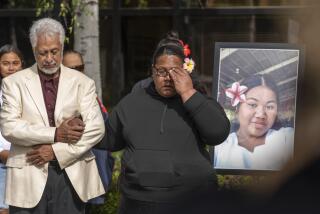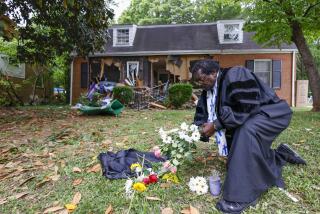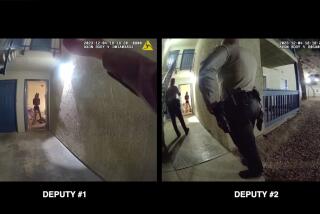FBI to probe slaying of woman, 88, in shootout
- Share via
ATLANTA — It sounded like a sick parody of inner-city life: an 88-year-old woman gunned down in a shootout with police.
But the slaying was real, and for a week the ugly fact of it has reverberated across Atlanta. On Tuesday night, it was shocking enough to attract 300 people to a Baptist church in the troubled neighborhood where the woman, Kathryn Johnston, had lived. There the protesters found Police Chief Richard J. Pennington, standing near the altar in his blue uniform, sweating. And they let him have it.
“You need to talk to your people, man!” shouted Benjamin Hayes, 34. “Because they’re killing us!”
Pennington bowed his head. “I’ve got your concern,” he said softly.
Tuesday was the day Pennington pleaded for calm in Atlanta, in print and in person, as anger, particularly from black residents, continued to build one week after the bizarre shooting. At Lindsay Street Baptist Church, the audience, almost all black, served up a mixture of boos, cheers and heckles for the chief, who also is black.
He grimaced through it. He said he had turned the case over to the FBI to ensure an impartial investigation. He promised they would get to the bottom of things. The message didn’t go down easily.
“The police are trained to kill black people!” one woman shouted.
Pennington understood their frustration, he told a reporter afterward. “I felt they had to take their anger out on someone. I’m a big boy.”
Concern over police shootings was running high in the Atlanta area before the incident. This month in suburban DeKalb County, which is east of Pennington’s jurisdiction, prosecutors asked a grand jury to review police investigations of 12 fatal officer-involved shootings since Jan. 1. Nearly all of the suspects killed by county police were black.
Pennington’s first appeal to Atlantans came Tuesday morning, in an opinion article in the Atlanta Journal-Constitution.
“This tragic incident has shaken this community to its core, and the residents deserve honest answers,” he wrote. “But I must ask for patience and calm as we get to the bottom of the events of Nov. 21.”
It was that evening, according to police accounts, that plainclothes officers stormed the elderly woman’s house. They were looking for drugs, and they had obtained a warrant that didn’t require them to knock. Johnston allegedly shot and wounded three of them before they gunned her down.
On Tuesday morning, her friends and family gathered at a small funeral chapel for a memorial service. In the parking lot afterward, Edward O. DuBose, president of the Georgia State Conference of the NAACP, called the slaying an example of “police brutality and lawlessness against African Americans.”
After sundown, the crowd gathered at the church. Some marched down Joseph E. Lowery Boulevard, starting off from the block where Johnston had lived. Her home was relatively well-kept, but many are boarded up, in need of repairs and paint. One property owner pointed across a busy street up a hill: That, he said, is where the drugs and the sex are sold.
Johnston’s neighbor, A.S. Jennings, 76, said she would skip the protest. She isn’t much of a rabble-rouser, and she appreciated the police who tried to keep the drugs off her block. But she said she was sure something was wrong with the police account of that night. Johnston, she said, was a sharp, opinionated woman who led a happy, healthy life. She worked out on a stair machine, and watched City Council meetings. She was sharp for 88, and deeply spiritual.
“This was a farce,” Jennings said. “That lady didn’t sell any drugs, and she wouldn’t let anybody in her house who sold drugs.”
Since the shooting, questions have arisen about the officers’ version of events. In their application for the search warrant, investigators said they watched an informant go into the house and come out with crack. They suspected a big, bearded man named Sam of selling it. But this week, a man who claimed to be the informant told a local TV station that police asked him to lie.
“They were going to pay me just to cover it up,” said the unidentified man. “They called me immediately after the shooting to ask me, I mean to tell me, here’s what you need to do. You need to cover our ass and that’s exactly how he said it, you know? It’s all on you man.”
In the newspaper article, Pennington acknowledged that “many people are understandably suspicious that the Atlanta Police Department is trying to cover up the facts surrounding this case,” but he promised that the “complete truth” would be revealed in the federal inquiry.
Pennington has placed seven narcotics investigators and a police sergeant on paid leave. He also said the department would review its policy on “no knock” warrants, as well as the use of confidential informants.
In a statement, Atlanta Mayor Shirley Franklin said that turning over the case to the FBI was an “honest attempt to be transparent.”
“The community deserves the truth, and I am confident that this will be accomplished through the thorough investigation,” she said.
*
jenny.jarvie@latimes.com
More to Read
Sign up for Essential California
The most important California stories and recommendations in your inbox every morning.
You may occasionally receive promotional content from the Los Angeles Times.











